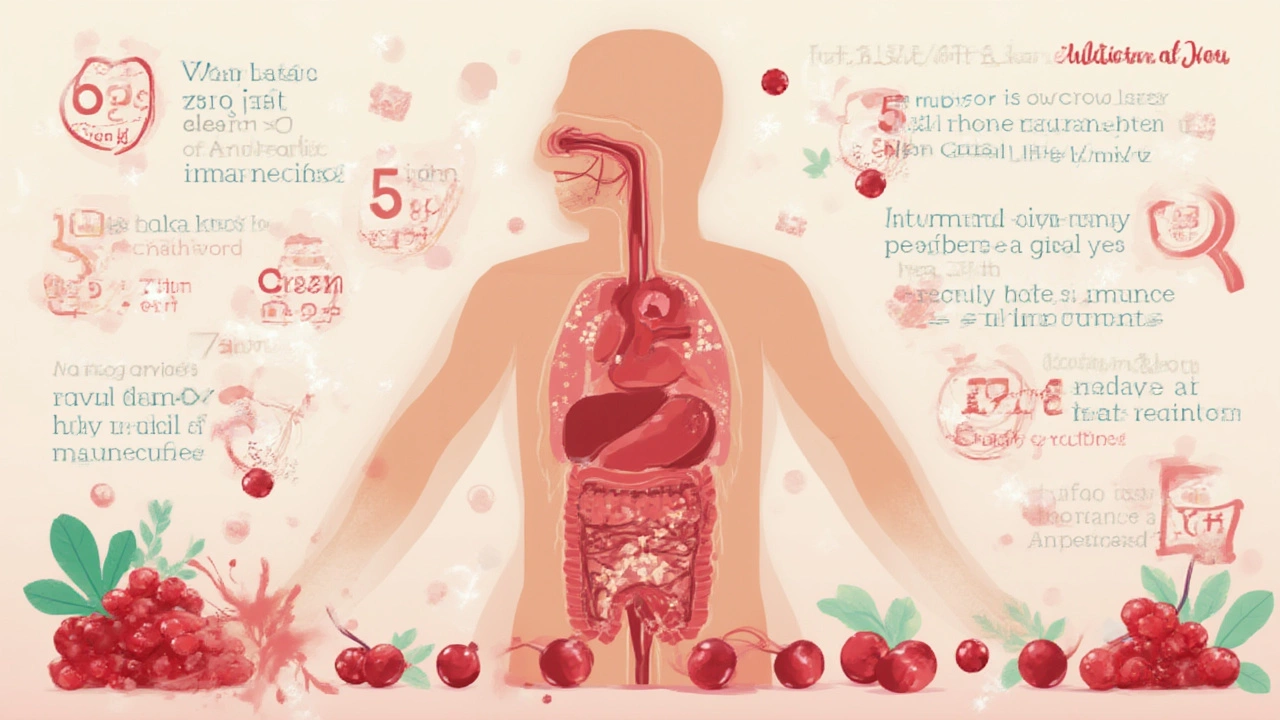You probably know that tart zing when biting into a cranberry muffin or sipping juice. But did you know this humble berry does so much more than wake up your taste buds? For decades, cranberries have been quietly working wonders behind the scenes—especially in the world of supplements. While your mum or gran may have handed you juice for bladder troubles, science has been busy unlocking even bigger secrets. The truth is, hiding in those little red power-punchers, there’s a molecular toolkit for not just your urinary tract but your heart, immune system, and maybe your whole well-being. Let’s get curious, bust some myths, and see if popping a cranberry capsule is genuinely worth all the hype—or if it’s just another wellness fad clutching at tart straw.
How Cranberry Supplements Work: Science, Myths, and Real Results
First off, cranberries aren't magic, but they're packed with unique plant compounds called proanthocyanidins—PA-Cs for short. That long name explains their secret weapon: these compounds mess with the way bacteria, like E. coli, stick to the walls of your urinary tract. So, instead of letting bacteria get comfortable and multiply inside your bladder, PA-Cs basically help flush them out every time you pee. Interesting, right? What’s even cooler is that a 2023 meta-analysis (yes, fresh off the press) showed that cranberry supplements can actually reduce the risk of recurring UTIs in women by over 25%. That's not just folklore—that’s real data. Here’s a quick snapshot to make it clear:
| Year | Study Group | Reduction in UTI Risk |
|---|---|---|
| 2023 | Women with history of UTIs | 25% |
| 2022 | Older adults | 18% |
| 2021 | Children prone to UTIs | 31% |
It’s worth noting, though, not all cranberry supplements are made the same. You want to look for supplements that specifically say they contain “standardized” cranberry extract with 36mg PACs per day. Some cheaper brands just use generic powder—basically, you’re paying for pink dust and hope. Always check the label, especially that PACs number. Now, in Dunedin and everywhere else, even with the perfect product, cranberry supplements aren't a golden ticket to never getting a UTI again. Good hygiene, drinking decent water, and avoiding harsh soaps around your bits are still necessary. But, as the data shows, cranberry offers a genuine edge.
Of course, where there’s hype, there’s confusion. Some folks think cranberry cures UTIs—nope, it helps prevent them. If you’re already dealing with that familiar, burning discomfort, see your doctor. Antibiotics still do the heavy lifting in an active infection. Then there’s the juice versus supplement debate. Juice is lovely, but the bottled stuff often has more sugar than a fizzy drink and not nearly enough PA-Cs to actually make a difference. Supplements get you the proper dose—minus the sugar spike.
On the safety side, cranberry capsules are, for most people, just fine. There are some quirks, though. If you’re on blood thinners (like warfarin), best check in with your doctor—cranberries can make certain meds wonky. And anyone with a tendency toward kidney stones should be cautious, since cranberries have oxalates, which can add fuel to the fire. For everyone else, they’re about as safe as popping a vitamin C tablet.

The Surprising Heart and Immune Benefits of Cranberry Supplements
Most people stop at bladder health, but cranberry supplements have an underrated second act: heart health. Sure, it might sound far-fetched, but the same antioxidants that keep your urinary tract flush and clean are busy in the bloodstream too. Proanthocyanidins, flavonols, and even vitamin C work together to curb inflammation and keep your blood vessels flexible. If you’re picturing a cranberry playing superhero, it’s not far off. A New Zealand-based 2022 double-blind trial found that adults supplementing with cranberry extract for 12 weeks had, on average, a 7% decrease in systolic blood pressure. Granted, that won’t replace blood pressure meds, but it’s nothing to scoff at either.
Here’s a little more to chew on. Those same trial folks also showed improved “cholesterol profiles”—meaning their “bad” LDL cholesterol dropped a bit, while “good” HDL chilled out at a healthy level. Scientists think this has to do with the polyphenols in cranberries helping the body process fats and reduce chronic inflammation. You won’t get all the benefits if you’re also scarfing down burgers and chips, but if you add cranberries to a healthy lifestyle, your arteries might thank you in the long run.
What about your immune system? Research hints at a subtle, but meaningful, boost. The antioxidants swimming around in cranberry extract help mop up harmful free radicals and reduce oxidative stress. Why does that matter? Well, less oxidative stress equals less chronic inflammation, which means your immune system isn’t constantly fighting “ghost” infections and can respond faster when real bugs come calling. A 2021 Australian study on healthcare workers found they caught fewer colds and got over minor infections more quickly if they took a daily cranberry supplement compared to a placebo group. You’re not going to become superhuman, but every edge counts, especially as the seasons change here in Dunedin.
The flavonoids and PACs in cranberries are also being researched for their potential to help keep gum disease at bay and even aid gut bacteria. Ever had a dental cleaning and didn’t want that “ouch” when poked between the teeth? Early data suggests that cranberry’s anti-adhesion superpower—similar to its urinary tract magic—might reduce the ability of gum-trouble-causing bacteria to stick around. As a byproduct, you could sneak in some gut support, because polyphenols seem to nudge your intestinal microbes in a good direction. Win-win!
Pretty cool for a fruit picked in bogs and wetlands, right? With all this science unwrapping new benefits, cranberries may quietly be one of the sneakiest multitaskers in your supplement stash.

Using Cranberry Supplements Wisely: Tips, Dosage, and What to Watch Out For
If you’ve decided it’s time to try cranberry supplements, don’t just grab the first bottle you spot. The supplement aisle is wild—labels everywhere, all sorts of doses, and claims as tangy as the berries themselves. Here’s where you want to get fussy: look for products that not only list “cranberry extract” but also show the specific amount of proanthocyanidins (PA-Cs) per serving—36mg per day has been tested and proven in multiple studies to actually make a difference for UTI prevention. Anything less, and you’re basically paying for a placebo effect. Capsules are easy and, for most people, gentler on the stomach than sugary gummies or drinks.
How should you take it? Consistency is key—you need to take your supplement daily, ideally with water and a meal. Skipping days or stopping after a week isn’t going to cut it. If you’re prone to UTIs, many doctors suggest staying on cranberry for several months at a time. To really stack the odds in your favor, don’t use cranberry supplements as an excuse to skip out on other UTI prevention steps. That means peeing after sex, wiping front to back, and hydrating like it’s your job (your bladder will thank you for not making its life harder).
- Look for “standardized extract” and 36mg PACs per day
- Avoid supplements with lots of added sugar or artificial colors
- Check the expiry date—active compounds lose punch over time
- If you’re pregnant, taking blood thinners, or have kidney issues, talk to your GP first
If you’re adding new supplements to your routine, be honest with your care team—especially if you’re on any regular meds. Some people experience mild tummy upsets with high doses, so maybe start with the lowest effective dose and see how your system handles it. And don’t expect miracles overnight; most studies tracked benefits after consistent use over weeks, not days.
Want a quick cheat sheet for cranberry shopping? Skip “proprietary blends”—those are often code for “we won’t tell you what’s in it.” Stick with established brands that actually show their PAC content and have recent production dates. If you’re running around Dunedin pharmacies, there are local brands that do cranberry right—just read the fine print. If you go for juice instead, remember: the juice must be at least 25% real cranberry, not just apple or grape with a splash of cranberry flavor. Better yet, skip the sugary stuff and let supplements do the heavy lifting.
Even if you have a sweet tooth, cranberry is best as a targeted health tool, not a dessert. Keep up your regular healthy habits, add in the supplement dose that matches real-world research, and your bladder, heart, and immune system could all get a helpful nudge.

Oh wow, another ‘miracle berry’ article. Let me guess-next week someone’s gonna say cranberries cure cancer and also fix your Wi-Fi. I’ve been taking these since 2018 because my mom said so, and I still got a UTI last month. The science sounds nice, but I’m pretty sure my body just pees out the PACs and laughs at them. Also, 36mg? That’s less than what’s in a single cup of grocery store juice, which is basically sugar water with a side of regret. If I wanted a placebo with a side of tartness, I’d just suck on a lemon and call it a day.
Also, why do supplement companies always say ‘standardized extract’ like it’s a secret handshake? If it’s so standardized, why does every bottle taste like chalk and disappointment?
Let’s cut through the fluff. The 2023 meta-analysis you cited includes studies with wildly different dosages, populations, and endpoints. The 25% reduction? That’s statistically significant but clinically negligible. You need to take 1000+ capsules per year to prevent maybe one UTI in a high-risk group. Meanwhile, the cost, potential interactions with warfarin, and oxalate load make this a net negative for most people. The heart health claims? Correlation isn’t causation. That NZ study had 87 participants and no control for diet. And the immune boost? You’re telling me a berry extract beats sleep, hydration, and handwashing? Please. This isn’t prevention-it’s financial therapy for people who want to believe they’re doing something proactive while sitting on their couch.
Bottom line: if you’re not a recurrent UTI patient with documented bacterial adhesion issues, save your money. And if you are? Talk to a urologist, not a supplement marketer.
While the article presents a compelling narrative, the methodological rigor of the cited studies warrants closer scrutiny. The meta-analysis referenced lacks transparency regarding heterogeneity in intervention protocols, particularly regarding the bioavailability of proanthocyanidins across commercial formulations. Moreover, the observed reductions in UTI incidence-while statistically significant-are not consistently replicated in large-scale, double-blind, placebo-controlled trials with longer follow-up periods. The assertion that cranberry supplements confer cardiovascular benefits is further undermined by the absence of hard endpoints such as myocardial infarction or mortality reduction. The immune modulation claims, though biologically plausible, remain speculative without longitudinal biomarker data. One must also consider the potential for publication bias in the literature, wherein positive results are disproportionately represented. In the absence of regulatory standardization and independent verification of supplement composition, the utility of cranberry supplementation remains, at best, marginal and context-dependent.
For anyone reading this and wondering if it’s worth trying-yes, but with realistic expectations. I started taking cranberry supplements after three UTIs in one year, and while they didn’t make me invincible, they definitely reduced the frequency. I pair it with drinking half my body weight in water daily and peeing after sex-no magic, just habits.
And yes, the heart stuff? I noticed my blood pressure stabilized after three months, not because of the cranberry alone, but because I was finally paying attention to my health. It’s not a miracle, but it’s a gentle nudge in the right direction. If you’re already eating clean, sleeping well, and moving your body? Add this in. If you’re not? Start with the basics. The supplement isn’t the hero-it’s the sidekick.
And please, for the love of all that’s holy, don’t buy the juice. Just… don’t.
im not a doctor but i took these for 3 months and my UTIs stopped. also my gums stopped bleeding. idk if it’s the cranberry or just that i finally started drinking water but hey, if it works, it works. also the capsules don’t taste like ass like the juice so that’s a win. just buy the one with the 36mg on the label, not the 500mg ‘cranberry powder’ crap. and yeah, i know i should prob go to the doc but i’m lazy and this is cheaper than urgent care. 🤷♂️